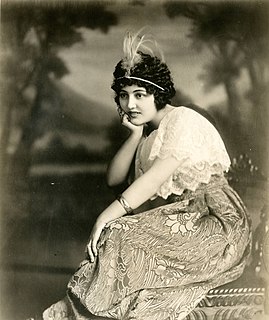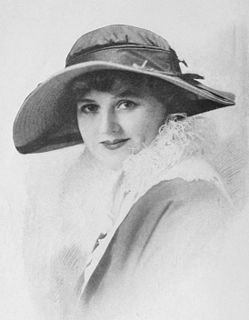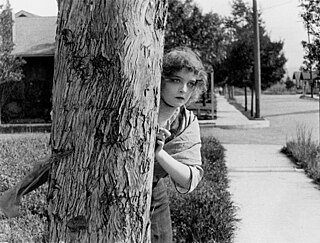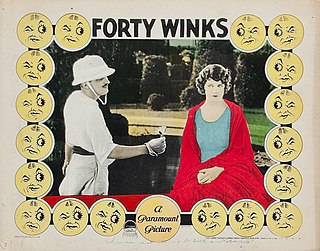
Lillian Diana Gish was an American actress, director and screenwriter. Her film acting career spanned 75 years, from 1912, in silent film shorts, to 1987. Gish was called "The First Lady of American Cinema", and is credited with pioneering fundamental film performance techniques. In 1999, the American Film Institute ranked Gish as the 17th greatest female movie star of classic Hollywood cinema.

Dorothy Elizabeth Gish was an American actress of the screen and stage, as well as a director and writer. Dorothy and her older sister Lillian Gish were major movie stars of the silent era. Dorothy also had great success on the stage, and was inducted into the American Theater Hall of Fame. Dorothy Gish was noted as a fine comedian, and many of her films were comedies.

The Biograph Company, also known as the American Mutoscope and Biograph Company, was a motion picture company founded in 1895 and active until 1916. It was the first company in the United States devoted entirely to film production and exhibition, and for two decades was one of the most prolific, releasing over 3000 short films and 12 feature films. During the height of silent film as a medium, Biograph was America's most prominent film studio and one of the most respected and influential studios worldwide, only rivaled by Germany's UFA, Sweden's Svensk Filmindustri and France's Pathé. The company was home to pioneering director D. W. Griffith and such actors as Mary Pickford, Lillian Gish, and Lionel Barrymore.

Clara Kimball Young was an American film actress, who was highly regarded and publicly popular in the early silent film era.

Robert Emmett Harron, also known as Bobby Harron, was an American motion picture actor of the early silent film era. Although he acted in over 200 films, he is possibly best recalled for his roles in the D.W. Griffith directed films The Birth of a Nation (1915) and Intolerance (1916).

Judith of Bethulia (1914) is an American film starring Blanche Sweet and Henry B. Walthall, and produced and directed by D. W. Griffith, based on the play "Judith and the Holofernes" (1896) by Thomas Bailey Aldrich, which itself was an adaptation of the Book of Judith. The film was the first feature-length film made by pioneering film company Biograph, although the second that Biograph released.

Henry Brazeale Walthall was an American stage and film actor. He appeared as the Little Colonel in D. W. Griffith's The Birth of a Nation (1915).

Home, Sweet Home (1914) is an American silent biographical drama directed by D. W. Griffith. It stars Earle Foxe, Henry Walthall and Dorothy Gish.

An Unseen Enemy is a 1912 Biograph Company short silent film directed by D. W. Griffith, and was the first film to be made starring the actresses Lillian Gish and Dorothy Gish. A critic of the time stated that "the Gish sisters gave charming performances in this one-reel film". The film was shot in Fort Lee, New Jersey where early film studios in America's first motion picture industry were based at the beginning of the 20th century. Consistent with practice at that time, the actors in the cast and their roles are not listed in the film..

Rhea Haines was a silent film actress from Indiana.

Lillian Walker, born Lillian Wolke, was an American film actress of the silent era. She appeared in more than 170 films, most of them shorts, between 1909 and 1934.

The Mothering Heart is a 1913 American short drama film directed by D. W. Griffith. A print of the film survives in the film archive of the Museum of Modern Art.

The Great Love is a 1918 American silent war drama film directed and written by D. W. Griffith who, along with scenario writer Stanner E.V. Taylor, is credited as "Captain Victor Marier". The film stars George Fawcett and Lillian Gish. Set during World War I, exterior scenes were shot on location in England. The Great Love is now considered to be a lost film.

The Scarlet Letter is a 1926 American drama film based on the 1850 novel of the same name by Nathaniel Hawthorne and directed by Swedish filmmaker Victor Sjöström. Prints of the film survive in the MGM/United Artists film archives and the UCLA Film and Television Archive. The film is now considered the best film adaptation of Hawthorne's novel.

Elizabeth Milbank Anderson, American philanthropist and advocate for public health and women's education, was the daughter of Jeremiah Milbank (1818–1884), a successful commission merchant, manufacturer and investor, and Elizabeth Lake (1827–1891). Anderson established in 1905 one of the first foundations funded by a woman, the Memorial Fund Association, with gifts of $9.3 million by the time of her death. Anderson in her lifetime supported a wide range of health and social reform efforts during the Progressive Era, from tuberculosis and diphtheria eradication to relief work for European children following World War I, for which she was made in 1919 a Chevalier of the Legion of Honor by the French government.
Photoplay Productions is an independent film company, based in the UK, under the direction of Kevin Brownlow and Patrick Stanbury. Is one of the few independent companies to operate in the revival of interest in the lost world of silent cinema and has been recognised as a driving force in the subject.

The House of Discord (1913) is a silent American drama film directed by James Kirkwood, Sr., written by F. E. Woods and A. Clayton Harris from a play by William C. deMille. The film stars Lionel Barrymore and marked the theatrical film debut of actor Jack Mulhall.

Forty Winks is a 1925 American silent comedy film directed by Paul Iribe and Frank Urson and written by Bertram Millhauser. The film stars Raymond Griffith, Theodore Roberts, Cyril Chadwick, William Boyd, and Anna May Wong. The film was released on February 2, 1925, by Paramount Pictures.

Catherine Chisholm Cushing was an American writer of songs, librettos, and plays, best known for her 1916 stage adaptation of Eleanor H. Porter's Pollyanna.
The Little Tease is a 1913 silent black and white film directed by D. W. Griffith, produced by Biograph Company and starring Henry B. Walthall and Mae Marsh.


















